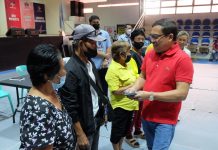In an effort to provide communications support to communities affected by disasters and emergencies, the Department of Social Welfare and Development (DSWD) and Smart Communications, Inc. (Smart) will forge a partnership today (April 21) that will extend free calls, internet use, and charging of mobile phones in the agency’s operations centers, as well as in designated evacuation centers.
“In times of disasters, the need for communication is as important as the need for food. People in disaster-stricken areas need to immediately communicate with their loved ones to assure them that they are safe or to ask for help,” DSWD Secretary Corazon Juliano-Soliman said.
“Through this partnership with Smart, the Department’s visibility and capability to respond to the most urgent needs of the affected population will be enhanced,” Sec. Soliman added.Â
Sec. Soliman cited the important role played by information and communications technology in the aftermath of Typhoon Yolanda.
For his part, Smart Public Affairs Head Mon Isberto said, “Communications has become an important component of disaster response. We have committed to support the relief operations of the DSWD by providing the agency our host of communications solutions so that they are able to effectively deploy resources on the ground, and other services that will provide psychosocial relief to disaster-stricken communities.”
“Our libreng tawag services will help families in affected areas reconnect with their loved ones and reunite with other family members who may have been displaced by disasters. These services have become part of our post-disaster relief and response as we recognize the need of people to communicate with loved ones and family in difficult times,” added Isberto.
Both the DSWD and Smart will work closely in formulating the guidelines for the implementation of this partnership anchored on the country’s National Disaster Response Plan.
“This partnership with the DSWD will further boost our response efforts. With DSWD as the lead agency tasked with the national government’s disaster response, this tie-up will allow us to serve more people and ensure that our resources are deployed to areas where they are most needed,” said Isberto.
Smart, through its year-round disaster preparedness and response umbrella program #SafePH, has strengthened its internal capabilities to prepare for disasters and help in post-disaster response, including the recalibration of its network infrastructure, and training of its on-ground personnel on surviving adverse conditions. It promotes the culture of preparedness to partner-communities, including religious organizations, schools, local government units, and even households in high-risk areas to build their capacities to prepare for, deal with the impact of, and bounce back from, disasters.Â
Smart also supports the GSMA Humanitarian Connectivity Charter, a landmark global telecommunications industry commitment to assist customers and responders before, during, and after humanitarian emergencies. It is one of the four founding signatories to the Humanitarian Connectivity Charter, along with Axiata, Etisalat, and Ooredoo that collectively represent over one billion subscribers in 35 countries. The Charter was signed at the Mobile World Congress in Barcelona, Spain.  Through the Charter, mobile network operators (MNOs) will commit to a common set of principles and work towards the adoption of initiatives focused on humanitarian connectivity to create a more coordinated and predictable response to disasters.DSWD is a member of the Disaster Response Pillar under the National Disaster Risk Reduction and Management Council (NDRRMC), and is the lead agency for the Camp Coordination and Camp Management, Protection, and Food and Non-Food Clusters.
0 Comments
Oldest






